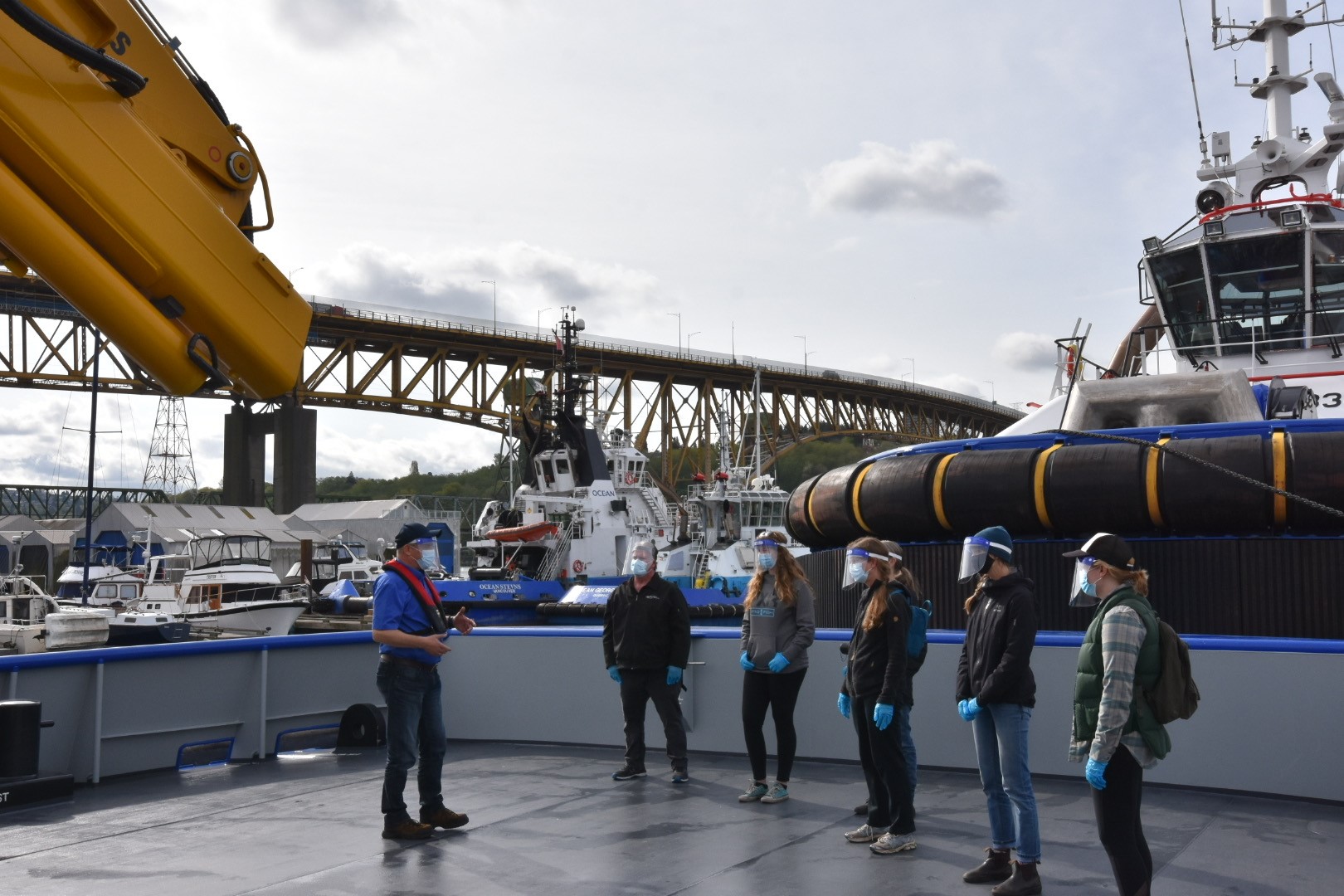The pandemic impacted Canada’s transportation sectors in a variety of ways – with some being met with colossal challenges, and others bestowed with new opportunities.
The BCIT School of Transportation also encountered hurdles and hidden benefits as it swiftly innovated in response to the COVID-19 pandemic and changing industry demands. Insight into how the past year has shaped the future of transportation in BC and beyond.
BCIT pivots to safely deliver applied learning

When the COVID-19 pandemic first hit in March of 2020, the School of Transportation reacted promptly and thoughtfully. After all, BCIT has been training students to be flexible and to problem-solve for decades.
Guy says it took a collaborative effort to pivot to remote learning, and to then reconfigure programs to allow a safe return to campus for students and faculty.
“Many of our programs transitioned to online learning within just a few days,” says Guy. “We then had to solve the logistics of delivering essential in-person training in a way that adhered to strict COVID-19 safety guidelines and protocols, which was a remarkable feat by everyone.”
“The Automotive team utilized their creativity to make portable, physical barriers using PVC pipe and polypropylene sheets,” says Guy. “It’s a great example of departments working together to create innovative solutions to safeguard our community.”
Guy says trades students were especially grateful that they could resume their apprenticeships, and ultimately reach their career goals.
“Because most jobs related to transportation were deemed essential, it was crucial that these students be able to complete their hands-on training, so they could safely support industry and progress in their careers.”
Preparing students for success in the workforce
There were certainly challenges as programs adjusted to the COVID-19 safety protocols, but as Guy explains, there were also some unexpected benefits.
“We found new and innovative ways of transferring knowledge and information to students, which may not have occurred under normal circumstances,” says Guy. “It’s this kind of inventiveness that BCIT is known for, and that will help students thrive in their future careers.”
He describes how the use of technology helped preserve, and even enhance, student learning on campus.
“We realized that, even with smaller groups, we couldn’t have students huddle around an instructor during a demonstration,” says Guy. “Our instructors used cameras and we had installed TV screens in the shops, so that all students could see what was happening from a safe distance.”
He also says the COVID-19 safety measures in the shops mimic those found in industry, so students will know what to expect when they enter, or re-enter, the workforce.
“We’re setting them up for success by acquainting them with these safety procedures that they’ll need to follow in workplace settings,” says Guy.
The safety protocols have led to many efficiencies and opportunities, and as students gain new skills as a result, they become better equipped for their future careers in transportation.
Have you subscribed? Sign-up to receive the latest news on BCIT.
Technology continues to drive the future of transportation
BCIT has long been a leader in training students for in-demand jobs, and looking ahead, the transportation sector will be rife with them. With BC planning major investments in infrastructure projects, BCIT is poised to train students for the future of transportation.
With technology advancing faster than ever before, Guy says the transportation industry is primed for some ground-breaking changes.
“We’ve seen huge growth in electric vehicle technology, and demand has been surging in recent years,” says Guy. “There’s still a long road ahead, but we’re seeing this seismic shift right now, and it’s pretty exciting.”
BCIT launched the first electric vehicle (EV) maintenance training program in Canada in 2019, and as Guy explains, it was a pivotal step forward.
“We’ve taken a leading role in zero-emission vehicle training, and we’re thrilled that three more colleges in BC will now be offering EV skills training,” says Guy. “BCIT is committed to working with industry and government to create high quality job opportunities in the transportation sector.”
Guy says we should expect to see more clean energy in other transportation modes including long haul trucking, rail, marine, and aviation.
“BC Ferries has several ships capable of full electric operation in the future, two of which are currently operating in a hybrid form,” says Guy. “Also, Harbour Air announced plans to certify the world’s first electric commuter airplane, so these are both positive signs for future transportation jobs.”
BCIT is actively working with industry partners to deliver cutting-edge training for transportation jobs, both now and in the future.
Learn more about BCIT programs to support a career in one of BC’s transportation sectors, including air, rail, road, and sea.
